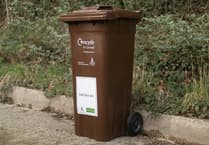IN amongst the rugged cliffs carpeted with gorse and heather, the ruins of engine houses and chimneys scatter Cornwall’s Tin Coast — stark relics of a mining industry which once defined the region.
Taking the place of their mining forebearers, Cornwall’s agricultural sector and farming communities now stand as one of the county’s major industries.
Yet, in the face of climate extremes, rising inflation and volatile markets, the tin mines are a looming reminder for Cornish farmers that deep-rooted industries aren’t always as permanent as they might seem.
With one of the wettest winters and coolest summers on record, Cornwall’s farms are having to adapt rapidly to climate extremes in an effort to preserve their land and livelihoods for future generations.

For British farmers facing these pressures, diversification could be a lifeline. As a result, Solar Energy UK, the solar industry’s trade body, has launched a national survey to capture experiences of farmers. The Farming Sustainably survey explores how solar energy could play a part in making farms more financially and environmentally sustainable. To fill in the survey, please visit: www.farmingsustainably.co.uk
One such family are the Williams of Presingoll Farm, who have been working their 200-acre farm within the St Agnes Mining District for five generations.
Mark Williams, his daughter Inez and brother Andrew have been sowing the seeds of regenerative farming on the outskirts of St Agnes for decades, carefully balancing tradition and cutting-edge innovation in an effort to improve soil health, carbon sequestration and biodiversity.
As with most farms, they’re not shielded from climate extremes and economic turbulence, but in embracing new ventures, renewable energy projects and regenerative practices, they have been able to build-in resilience.
Presingoll was a mixed lowland farm for hundreds of years, however over the last 20 years the family has worked hard to create a more modern, regenerative model. Mark and his brother Andrew were early pioneers of environmental diversification within the traditional farm model they inherited, which saw the pair become early adopters of organic principles and solar panels.

He comments: “You could say our early efforts were a little trial and error. The frames we had for our first solar arrays were made out of timber - suffice to say, they didn’t last long on the windy, salty Cornish coast.
“But today, we’re Red Tractor-assured, and through The Grower Plant Healthy accredited and UKISG. You could say we’ve come of age having won a Cornwall Sustainability Award in 2023 for Growing Greener.
“Through our solar panels, we supply electricity to a local industrial site and have launched into new ventures like The Grower tree nursery, a new business establish by Inez and her husband Chris. We’ve even trialled wind fences along our hedgerows and opened a dog exercise field (Paws at Presingoll Farm) during the COVID lockdowns.”
Extreme weather, escalating costs and shifting market demands have buffeted families like the Williams’, but Mark and Inez believe their efforts over the years has put them in a strong position for the future of sustainable food production and environmental protection.
According to Inez, the family’s early efforts into diversification has allowed her to carve out her own entrepreneurial path.
“Without the hard work and foundational knowledge of previous generations, we wouldn’t have been able to start the business in 2021,” she says.
It’s certainly paying off. In just a few years, Inez’s oversight of The Grower Nursery has seen it now grow more than two-million trees for bareroot production for the forestry and landscape markets.

She continues: “The ventures don’t only offer additional income, but they also strengthen our ties with the community, create local jobs and build a sense of shared responsibility in the face of a changing climate.”
The Williams family’s journey underscores a need for collaboration among farmers, to share ideas and to have a collective voice on vital issues. As pressures builds on British agriculture, the community’s input is being called on for farmers to share their views on what has been an especially challenging year.
The Solar Energy UK survey invites farmers across Cornwall and the UK to share their insights on how they’re navigating the pressures facing British farming and to suggest solutions for bolstering their long-term resilience.
For the Williams family, renewable energy has been a game-changer. By partnering with West Country Renewables, as well as direct investment they’ve harnessed solar power on their land. However, it’s not been without its challenges.
Antiquated infrastructure and limited grid capacity has prevented the family from expanding their solar operations further, leaving untapped potential on the table.
“More robust support for renewable energy on farms, improved infrastructure and streamlined planning could really help Cornish farmers to mitigate the peaks and troughs of fallow years,” he says.
That’s why he believes other farmers across the region should take part in the Solar Energy UK’s survey, to make sure their voices are heard. The results from the survey will be used to advocate for policy changes that consider the needs of farmers across the UK.
.jpeg?width=752&height=500&crop=752:500)



